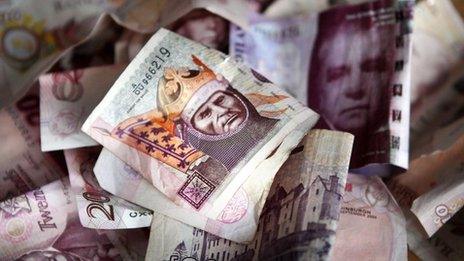Two sides shake on bill deal
- Published

Scots Secretary Michael Moore gave details of the deal at Westminster
So what was the fuss all about? Over the Scotland Bill, that is. From apocalyptic conflict, we have arrived at a late night deal to implement the provisions to enhance Holyrood's powers, including tax powers.
Politically, two interpretations are simultaneously available. The Scottish Secretary Michael Moore needed this Bill, external to reinforce his clout within the UK coalition.
If it had failed, he would have looked weak; unable to advance negotiations with the Scottish Government, unable to contain the challenge mounted by Alex Salmond and his Ministers.
Now his status is enhanced. He has secured the Bill with relatively few concessions - and none of the big ticket demands pressed by the Scottish Government such as the devolution of corporation tax.
He is entitled to feel quietly pleased with his endeavours and those of his team. Meanwhile, it is left to Willie Rennie, the Scottish Liberal Democrat leader, to lampoon the SNP approach to the Bill, to say that their demands simply crumpled under scrutiny.
Equally, however, the political ground has shifted. The Calman Commission, external report, the progenitor of this Bill, is no longer the prime Unionist offer as it was at the time of publication. The talk now is of further powers, possibly Devo Plus or Max.
Banking the gains
The SNP calculation, thereby, is that the real fight is now on that new ground. It is independence versus the new Unionist position. If they can contrive it, it will be independence versus Westminster Conservative rule.
And so they reckon they can feasibly shift to that ground, without losing face, while banking the gains from the Bill such as borrowing powers.

The bill's details will come before Holyrood
But what, one might reasonably ask, has happened to the earlier talk that the Bill was insufficient, even damaging?
Two things, mainly. Firstly, Scottish Ministers are adamant that they have secured concessions which mitigate the financial problems. Notably, they have agreed a revised - and potentially more sympathetic - system for assessing the Scottish economy which would be used to calculate the grant to be withdrawn in return for enhanced tax powers.
Secondly, it has been settled - but not in statute - that there will have to be joint agreement between the UK and Scottish Governments before the final stage of the new financial arrangements is put in place.
That is not a veto, say UK Government sources. It is common sense. They do not envisage that there will be a problem in that both sides have agreed that implementation of all elements of the Bill is a common intent.
Similarly, the Scottish Government seems to have settled for the deal - while noting that it remains a "missed opportunity". Their view seems to be that the focus now is entirely upon the independence offer.
As one put it to me: "The new tax powers are due to be introduced in 2016. We could be independent by then."
- Published21 March 2012

- Published7 September 2011

- Published22 June 2011
